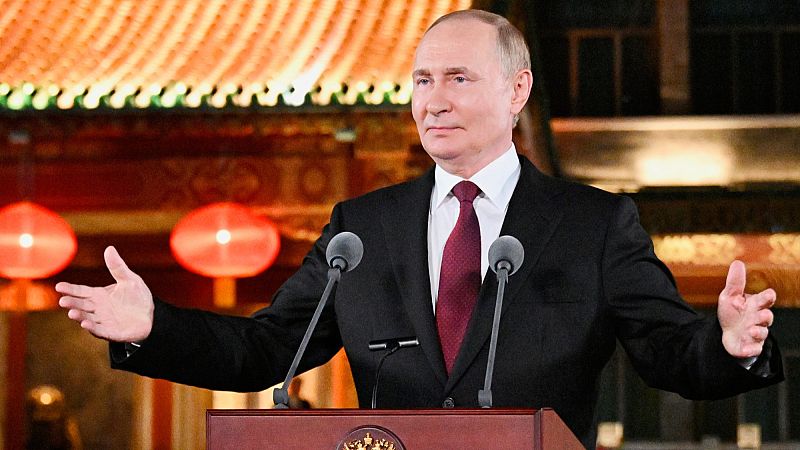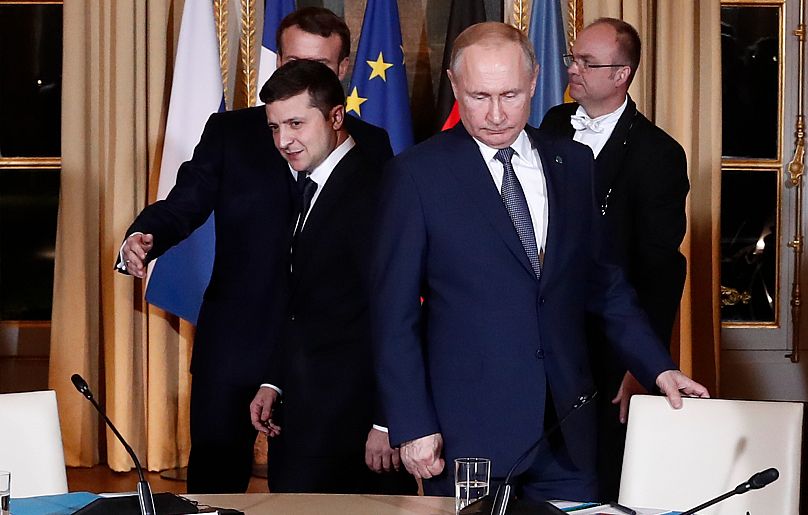Russia's Putin willing to meet Ukraine's Zelenskyy if he 'comes to Moscow'

Russian President Vladimir Putin expressed his willingness on Wednesday to arrange a face-to-face meeting with his Ukrainian counterpart Volodymyr Zelenskyy, but only if the summit is held in Moscow.
The Russian leader, who spoke at a press conference following the Victory Day parade in Beijing on Wednesday, said that US President Donald Trump asked for the two to sit down and discuss bringing an end to Russia's war in Ukraine.
"I said yes, it was possible, let him come to Moscow," Putin said.
"I've never excluded the possibility of meeting with him. But does it make sense to meet with him," he added, again questioning the legitimacy of Zelenskyy's presidency.
"We could do that, I've never refused to do that if that leads to some positive outcomes."
The Kremlin has repeatedly brought up the issue of Zelenskyy's presidential term having expired, despite Ukraine not being legally able to hold elections while it is at war and with a portion of its territory under occupation.
In response, Ukraine’s foreign minister rejected the idea of holding face-to-face talks with Putin, if they are to be held in the Russian capital.
In a post on X on Wednesday evening, Andrii Sybiha listed seven countries that had offered to host peace talks, which he called “serious proposals”.
“Yet, Putin continues to mess around with everyone by making knowingly unacceptable proposals. Only increased pressure can force Russia to finally get serious about peace process,” he said.
The latest words from Putin come after a flurry of meetings organised by Trump in August, including a summit with Putin in Alaska, quickly followed by another one with Zelenskyy and European and NATO leaders in Washington.
The meeting in Alaska did not produce immediate results, with Trump stating at the time that "we didn’t get there, but we have a good chance to get there."
However, the US president has since pushed for progress in ending Russia's war, vowing that Ukraine would receive substantial security guarantees as part of any future peace deal, as Europe remains "the first line of defence."
Moscow's war continues
Moscow has previously repeatedly rejected the possibility of direct Zelenskyy-Putin talks, citing various reasons, including that preparations are not yet complete, questioning Zelenskyy's legitimacy, and stating that they never agreed to any meeting in the first place.
Kremlin foreign policy aide Yuri Ushakov, who was present at the Alaska summit in August, said on Tuesday that no agreement was made between Trump and Putin to meet with the Ukrainian leader.
On Monday, Putin openly blamed the West and NATO for his ongoing all-out war against Ukraine during his address at the Shanghai Cooperation Organisation summit in Tianjin.
Putin defended his full-scale invasion of Ukraine in early 2022, telling those gathered that the war was "a result of a coup in Ukraine, which was supported and provoked by the West" — a reference to bloody Euromaidan protests in Kyiv, which ended in the removal of Kremlin-allied President Viktor Yanukovych in 2014.
"The second reason for the crisis is the West's constant attempts to drag Ukraine into NATO," Putin added.
The Russian president has repeatedly made similar accusations in the past without providing evidence.
Meanwhile, Russia has continued its daily bombardment of Ukraine, launching a barrage of more than 500 drones and two dozen missiles at several regions in Ukraine overnight on Wednesday.
It has also intensified its summer offensive in eastern Ukraine aimed at occupying all of the Donetsk region.
Today


